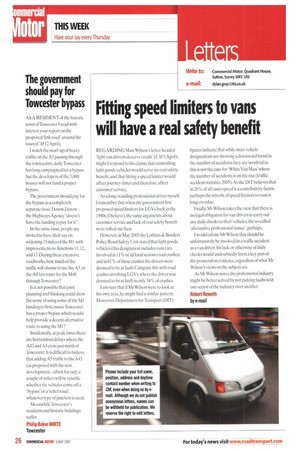Fitting speed limiters to vans will have a real safety benefit
Page 26

If you've noticed an error in this article please click here to report it so we can fix it.
REGARDING Matt Wilson's letter headed 'light van drivers deserve credit' (CM 5 April), might I respond to his claims that controlling light goods vehicles would serve no real safety benefit, and that fitting a speed limiter would affect journey times and therefore affect customer service.
As a long-standing professional driver myself, I remember that when the government first proposed speed limiters for LGVs back in the 1980s (I believe), the same arguments about customer service and lack of real safety benefit were rolled out then.
However, in May 2005 the Lothian & Borders Police Road Safety Unit stated that light goods vehicles (this designation includes vans) are involved in 11% of all fatal/serious road crashes; and in 61% of these crashes the drivers were deemed to be at fault. Compare this with road crashes involving LGVs. where the driver was deemed to be at fault in only 34% of crashes.
am sure that if Mr Wilson were to look at his own area, he might find a similar pattern. Moreover Department for Transport (DIT) figures indicate that while most vehicle designations are showing a downward trend in the number of accidents they are involved in, this is not the case for 'White Van Man' where the number of accidents is on the rise (traffic accident statistics 2005). As the llfT believes that in 26% of all cases speed is a contributory factor, perhaps the retrofit of speed limiters to vans is long overdue.
Finally, Mr Wilson takes the view that there is no legal obligation for van drivers to carry out any daily checks to their vehicles; the so-called 'alternative professional stance', perhaps.
I would advise Mr Wilson that should he unfortunately be involved in a traffic accident as a van driver, his lack or otherwise of daily checks would undoubtedly form a key part of the prosecution evidence, regardless of what Mr Wilson's views on the subject are.
As Mr Wilson notes., the professional industry might be better served by not picking faults with one sector of the industry over another. Robert Roweth by e-mail


























































































































































































